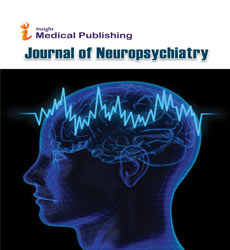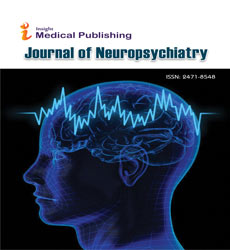The Consequences of Mental Health Disorders
Louise Smith*
Louise Smith*
Department of Psychological Medicine, King's College London, London, UK
- *Corresponding Author:
- Louise Smith
Department of Psychological Medicine
King's College London
London, UK
E-mail: louise.smith@gmail.com
Received Date: October 14, 2021; Accepted Date: October 28, 2021; Published Date: November 04, 2021
Citation: Smith L (2021) The Consequences of Mental Health Disorders. J Neuropsychiatry Vol.5 No.1:003
Description
This guide describes the care and treatment of people with common mental health disorders, including depression, generalized anxiety disorder (GAD), panic disorder, phobia, social anxiety disorder, obsessive-compulsive disorder (OCD), and post-traumatic stress disorder (PTSD). Make recommendations for effective identification, evaluation, and referral treatment in primary care. The guidelines also will apply to secondary care and related (but no specific recommendations) for prison services and non-NHS services (such as social services and voluntary and independent sectors). A special purpose of this guide is to integrate existing NICE guidelines to identify and assess common mental health disorders, and to provide recommendations to support the development of local approaches to care for these disorders. A mental disturbance (or mental illness) may be a condition that affects your thinking, feeling, mood, and behaviour [1]. They can be occasional or persistent (chronic). They affect your ability to get along with others and your daily functions. Depression may be a common mental disturbance and one among the leading causes of disability worldwide.
Globally, an estimated 264 million people are affected by depression. More women than men are affected by depression. Depression is characterized by sadness, loss of interest or happiness, feelings of guilt or low self-esteem, disturbed sleep or appetite, tiredness, and inability to concentrate. Patients with depression can also have a variety of physical complaints, but there is no obvious physical cause. Depression may last for a long time or recur, seriously affecting people's ability to work or cope with daily life at work or school. In the most severe cases, depression can cause suicide. Prevention programs have been shown to reduce depression in children (for example, through protection and psychological support after physical and sexual abuse) and adults (for example, through psychosocial assistance after disasters and conflicts) [2-5]. There are effective treatments. Mild to moderate depression can be effectively treated with talk therapy, such as cognitive behavioural therapy or psychotherapy. Antidepressants can be an effective form of treatment for moderate to severe depression, but they are not the first-line treatment for mild depression. It is not suitable for treating childhood depression, nor is it a first-line treatment for adolescents, so it should be used with caution.
Signs and symptoms of mental illness can vary depending on the illness, environment, and other factors. Symptoms of mental illness can affect mood, thoughts, and behaviour.
Examples of signs and symptoms include:
• Feeling sad or depressed
• Confused thinking or lack of concentration
• Excessive fear or worry, or extreme guilt
• Emotional ups and downs
• Withdrawing from friends and activities
• Significant tiredness, energy deficiency or sleep problems
• Disengagement from reality (delusions), paranoia or hallucinations
The determinants of mental health and mental disorders include not only personal attributes, such as the ability to manage one's thoughts, emotions, behaviours and interactions. With others, as well as social and cultural, economic, political and environmental factors, such as national policies, social protection, living standards, working conditions and community support. Stress, genetics, nutrition, perinatal infections, and exposure to environmental hazards are also factors that lead to mental disorders. Mental disorders affect people of all ages and racial/ethnic groups, but some populations are disproportionately affected and estimates suggest that only half of all people with mental disorders get the treatment they have. Furthermore, the psychological state and physical health are closely related. Mental disorders such as depression and anxiety can affect people's ability to request a part in healthy behaviour. Similarly, physical health problems can make it more difficult for people to solicit mental disorders [3]. Increasing the detection of mental disorders can help people get the treatment they have.
Most mental diseases are not considered "curable", but they are decidedly treated. Treatment for psychological status disorders varies to considerably challenge their individual diagnosis and, therefore, the severity of their symptoms and results may vary very on an individual level. Some mental diseases respond well to drugs. Other conditions respond better to conversation therapy. Some surveys also support the use of complementary and alternative therapies for certain conditions. Often, treatment plans will include a combination of treatment options and will require any attempt and error before finding what works best for you.
References
- Goff DC, Sullivan LM, McEvoy JP, et al. (2005) A comparison of ten-year cardiac risk estimates in schizophrenia patients from the CATIE Study and matched controls. Schizophr Res 80(1): 45-53.
- Hendrie HC, Lindgren D, Hay DP (2013) Comorbidity profile and healthcare utilization in elderly patients with serious mental illnesses. Am J Geriatr Psychiatry 21(12): 1267-1276.
- Brooks SK, Webster RK, Smith LE (2020) The psychological impact of quarantine and how to reduce it: Rapid review of the evidence. Lancet 395(10277): 912-920.
- Siskind D, Honer WG, Clark S (2020) Consensus statement on the use of clozapine during the COVID-19 pandemic. J Psychiatry Neurosci 4(5): 222-223.
- Hidalgo-Mazzei D, Murru A, Reinares M, Vieta E, Colom F (2016) Big data in mental health: A challenging fragmented future. World Psychiatry 1(5): 186-187.

Open Access Journals
- Aquaculture & Veterinary Science
- Chemistry & Chemical Sciences
- Clinical Sciences
- Engineering
- General Science
- Genetics & Molecular Biology
- Health Care & Nursing
- Immunology & Microbiology
- Materials Science
- Mathematics & Physics
- Medical Sciences
- Neurology & Psychiatry
- Oncology & Cancer Science
- Pharmaceutical Sciences
